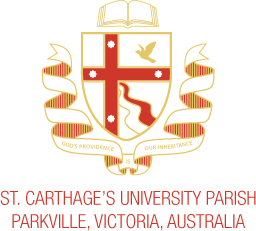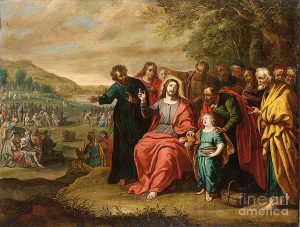The Most Holy Body and Blood of Christ Year C
Entrance Antiphon
He fed them with the finest wheat
and satisfied them with honey from the rock.
First Reading: Genesis 14:18-20. A reading from the book of Genesis
Melchizedek brought bread and wine.
Melchizedek king of Salem brought bread and wine; he was a priest of God Most High. He pronounced this blessing:
‘Blessed be Abraham by God Most High, creator of heaven and earth,
and blessed be God Most High for handing over your enemies to you.’
And Abraham gave him a tithe of everything.
Responsorial Psalm: You are a priest for ever, in the line of Melchizedek.
- The Lord’s revelation to my Master:
‘Sit on my right:
I will put your foes beneath your feet.’ (R.)
- The Lord will send from Zion
your sceptre of power:
rule in the midst of all your foes. (R.)
- A prince from the day of your birth
on the holy mountains;
from the womb before the daybreak I begot you. (R.)
- The Lord has sworn an oath he will not change.
‘You are a priest for ever,
a priest like Melchizedek of old.’ (R.)
Second Reading: 1 Corinthians 11:23-26. A reading from the first letter of St Paul to the Corinthians
Every time you eat this bread and drink this cup, you are proclaiming the death of the Lord.
This is what I received from the Lord, and in turn passed on to you: that on the same night that he was betrayed, the Lord Jesus took some bread, and thanked God for it and broke it, and he said, ‘This is my body, which is for you; do this as a memorial of me.’ In the same way he took the cup after supper, and said, ‘This cup is the new covenant in my blood. Whenever you drink it, do this as a memorial of me.’ Until the Lord comes, therefore, every time you eat this bread and drink this cup, you are proclaiming his death.
Gospel Acclamation: Alleluia, alleluia! I am the living bread from heaven, says the Lord; whoever eats this bread will live for ever. Alleluia!
Gospel: Luke 9:11-17. A reading from the holy Gospel according to Luke
Jesus made the crowds welcome and talked to them about the kingdom of God; and he cured those who were in need of healing.
It was late afternoon when the Twelve came to him and said, ‘Send the people away, and they can go to the villages and farms round about to find lodging and food; for we are in a lonely place here.’ He replied, ‘Give them something to eat yourselves.’ But they said, ‘We have no more than five loaves and two fish, unless we are to go ourselves and buy food for all these people.’ For there were about five thousand men. But he said to his disciples, ‘Get them to sit down in parties of about fifty.’ They did so and made them all sit down. Then he took the five loaves and the two fish, raised his eyes to heaven, and said the blessing over them; then he broke them and handed them to his disciples to distribute among the crowd. They all ate as much as they wanted, and when the scraps remaining were collected they filled twelve baskets.
REFLECTION
A city, an ark, a beacon. Three different images, but always one thing. We are called, as Jesus prayed at the Last Supper, to be one.
Because the unity of ‘the entire mystical Body of the Church’ is critical to who we are, our Eucharistic celebrations, therefore, must never become opportunities for exclusion. Our liturgies should always proclaim to the world the healing and all-inclusive power of Christ.
Indeed, as Leo suggests, the Church most authentically witnesses to Christ ‘not so much through the magnificence of her structures or the grandeur of her buildings … but rather through the holiness of her members.’
And holiness, properly understood, is a type of human wholeness. It is devout, but not dour. It is fulsome, not fanatical. True holiness, the Pope notes, reflects ‘joyful faith in Jesus the Saviour.’ We are called to be joyful because we are people of the Resurrection!
As such, joy should always infuse our sharing the good news. Joyous news, after all, is most attractive when it is joyfully shared.
by Nick Brodie

